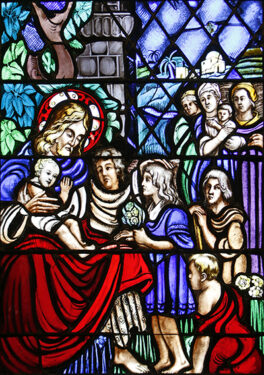I cannot remember when I began to think of the enormous mystery that Divine Providence is. It is one of the truly amazing Christian Mysteries. Was it when I was in high school? College? The Seminary? After I was ordained a priest? I just cannot recall, but whenever it was the wonder and awe and gratitude still accompany my contemplation of it. One of Pope Francis’ remarks that continues to inspire is his statement that he is convinced that God is part of every person’s life.
I certainly should have believed that before I became aware of Pope Francis’ statement, but somehow his expression of his own faith greatly influenced my faith. God is part of every person’s life. What could be more amazing, wonderful and encouraging than that truth?

When I try to imagine God involved in the lives of billions of people, of the Holy Spirit, trying to help people grow closer to the Father, all images fail me and I just marvel at the mystery. My appreciation of Divine Providence has accompanied my reflection and contemplation of the mystery of the human person. As I have grown in my appreciation of the human person, I think I have grown in my appreciation of Divine Providence and vice versa.
One of the most profound truths about the human person is that every person is called to live as a gift-giver. The primary gift that a person is called to give is himself or herself. Every person is called, the rich and the poor, geniuses and the mentally challenged, the physically sick and the physically healthy, the young and the old. A person can decide how to respond to that call or even whether to respond, but the person has no choice about whether he or she is called.
Who is calling? Every person is calling. To be a person not only means to be called but also to “be” a call. To be a person is to need other persons. The “self-made person” does not exist.
Every human person is finite, limited and need. Any people who don’t know this about themselves are missing one of the most profound truths about themselves. Am I saying that every person I meet says to me, “I need you. Help me”? Of course not. The key word is “be.”
The person “is” a call, “is” a need, “is” an appeal. Can we put this call into words? I like the expreesions “Be with me, help me to grow, help me to be more free, help me to enrich my existence as a person.” Who is calling? Everyone: the rich and the poor, the exceptionally intelligent and the intellectually challenged, the healthy and the physically sick, the young and the old, fetuses and people in a coma in a nursing home.
The call is the call to be loved. The deepest need of a human person is to be loved. Babies who are washed, fed and clothed but not loved die. All the baby’s physical needs can be met, but if not loved the baby dies. Everyone has a radical, existential need to be loved. That should be the response to the call. Can we put that response into words? I like the expressions, “I am for you, I am at your service, my freedom is available to serve your freedom. I love you.”
Of course there are levels of loving. Love can be shown by a smile, a greeting, opening a door for someone, thanking someone, or it can be shown through the vows expressing a life commitment such as the vows at a marriage ceremony or a priestly ordination or a baptism.
The response is some kind of gift of self. I think love is the free self-gift of one person to another person or to some group of persons.
So if my view of the human person is correct then every person in their very being is a call, is a need, is an appeal. This is the way God made us. We are called to be lovers. Not only are we called by other persons but we are called by God.
This means that each person’s self-gift is desired by God in terms of God’s providential presence to us. This means that Lauder’s self-gift and indeed every person’s self-gift is indispensable. There are no substitutes.
No one can make my self-gift. Only I can make it. If I don’t make a self-gift of love then that gift is not made and God’s providential plan will not happen the way God wishes it to happen. Of course, God’s providence will in some way make up for my failure, but it will not happen through my contribution because I will not have responded. It is awesome that each one has an indispensable gift, that God involves us that deeply in God’s providential plan.
Father Lauder is a philosophy professor at St. John’s University, Jamaica. He presents two 15-minute talks from his lecture series on the Catholic Novel, 10:30 a.m. Monday through Friday on NET-TV.
